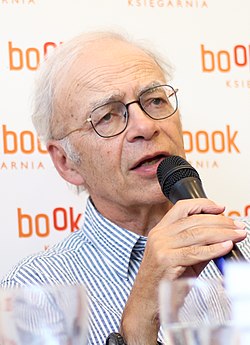Peter Singer Quote
A consequence of this alienation of humans from their own nature is that they are also alienated from each other. Productive activity becomes ‘activity under the domination, coercion and yoke of another man’. This other man becomes an alien, hostile being. Instead of humans relating to each other co-operatively, they relate competitively. Love and trust are replaced by bargaining and exchange. Human beings cease to recognize in each other their common human nature; they see others as instruments for furthering their own egoistic interests.
Peter Singer
A consequence of this alienation of humans from their own nature is that they are also alienated from each other. Productive activity becomes ‘activity under the domination, coercion and yoke of another man’. This other man becomes an alien, hostile being. Instead of humans relating to each other co-operatively, they relate competitively. Love and trust are replaced by bargaining and exchange. Human beings cease to recognize in each other their common human nature; they see others as instruments for furthering their own egoistic interests.
Related Quotes
About Peter Singer
Peter Albert David Singer (born 6 July 1946) is an Australian moral philosopher who is Emeritus Ira W. DeCamp Professor of Bioethics at Princeton University. Singer's work specialises in applied ethics, approaching the subject from a secular, utilitarian perspective. He wrote the book Animal Liberation (1975), in which he argues for vegetarianism, and the essay "Famine, Affluence, and Morality", which argues the moral imperative of donating to help the poor around the world. For most of his career, he was a preference utilitarian. He revealed in The Point of View of the Universe (2014), coauthored with Katarzyna de Lazari-Radek, that he had become a hedonistic utilitarian.
On two occasions, Singer served as chair of the philosophy department at Monash University, where he founded its Centre for Human Bioethics. In 1996, he stood unsuccessfully as a Greens candidate for the Australian Senate. In 2004, Singer was recognised as the Australian Humanist of the Year by the Council of Australian Humanist Societies. In 2005, The Sydney Morning Herald placed him among Australia's ten most influential public intellectuals. Singer is a cofounder of Animals Australia and the founder of the non-profit organization The Life You Can Save.
On two occasions, Singer served as chair of the philosophy department at Monash University, where he founded its Centre for Human Bioethics. In 1996, he stood unsuccessfully as a Greens candidate for the Australian Senate. In 2004, Singer was recognised as the Australian Humanist of the Year by the Council of Australian Humanist Societies. In 2005, The Sydney Morning Herald placed him among Australia's ten most influential public intellectuals. Singer is a cofounder of Animals Australia and the founder of the non-profit organization The Life You Can Save.
